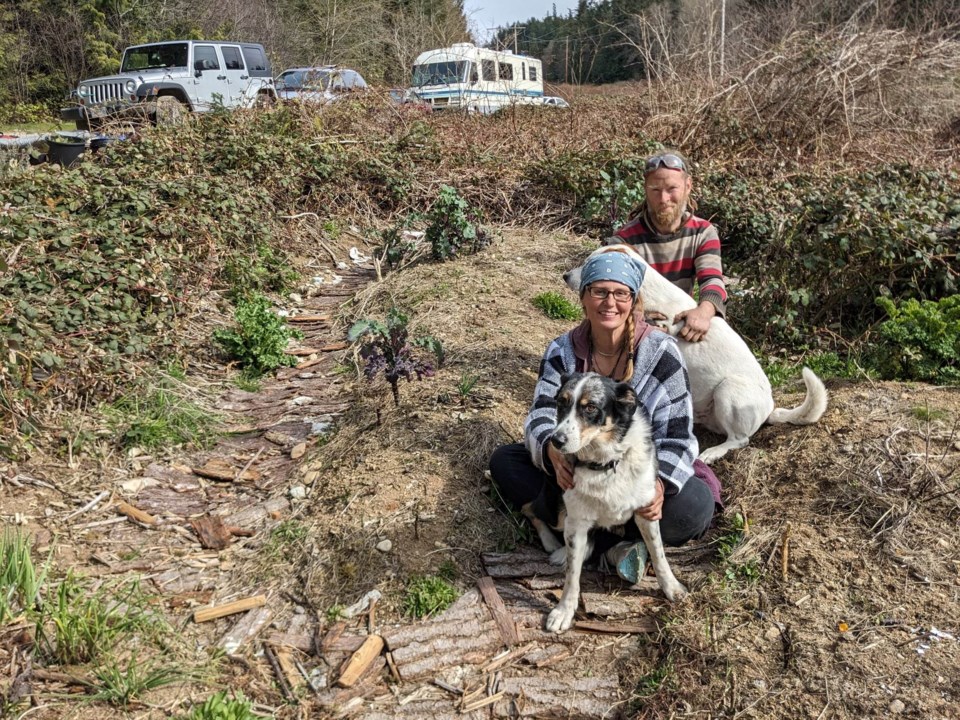Morgen Eckert was gardening when I drove up to the encampment under the powerlines just off of Largo Road, April 13.
“Camp” as Eckert calls it, is just one of the dozens – maybe more – of groups of people living outdoors on the Coast, though not all of them have a garden with a stone pathway, or someone of Eckert’s diligence guiding communal safety.
There were about seven people living or staying there at the time, though Eckert estimates more than 40 had lived in the stretch of BC Hydro land in the six years he’s lived there off and on.
“Most of the people that end up here are pretty vulnerable. They’re going through a hard time, a lot of them have failed society’s expectations,” said Eckert. “They’ve slipped into alcoholism, or they’ve had medical problems and can’t work anymore. But in general, they are good people.”
Eckert, as the defacto caretaker of Camp (who also works as a landscaper, labourer and hopes to be a master gardener) had reached out to the Coast Reporter as we had recently published a couple of pieces on encampments – and whenever such stories would come out, Camp residents would be subject to harassment, said Eckert. “It’s important for us to garner the social support of the greater community of the Sunshine Coast. Because we need to be able to be stable.”
This camp includes structures in various states of permanence: RVs and vehicles that come and go as well as semi-permanent structures. Some are nestled into the woods “yelling distance” away, others are more visible to casual passersby. One structure is a hut of semi-opaque plastic with a rocket stove inside. They’ve dug down a foot and filled the hole with gravel and sand so as to not be a fire danger. Down another path there’s remains of a tent that was crushed by snow, and another hut. Where there are piles of belongings or abandoned items, Eckert notes where items came from and where they’re headed.
The area is also an example of people living with nature – with bears and other wildlife. “When you live out here, it’s par for the course you have to clean up after yourself,” said Eckert.
There’s a balance, says Eckert. “We can only have so many dysfunctional people before the area becomes overwhelmed so we need some functional people here to help the dysfunctional people.”
“We’ve got people here who are just trying to live, but they’re schizophrenic and they don’t put the book back on the shelf when they’re done reading it,” said Eckert. “They don’t have the etiquette.”
If they’re too disruptive or chaotic, the bears come or the RCMP have to attend. But if Camp gets disbanded, people just come back, says Eckert, and may not be so respectful to the space.
Eckert says he’s taken on the responsibility to clean up after people and provide them with safety.
“We have some retired people here – we have a little grandma living over in the woods and she can’t do this on her own. She can’t walk up and down the hill every day to go get groceries.” The senior has moved three times in the past year, said Eckert. “She has to rest for like two days after, she gets so exhausted.”
Eckert has been on his own journey. “Six years ago, I was gonna be homeless on the Downtown Eastside, addicted to heroin and meth. And I said, F– that. I’m going to go live in the woods and get clean.”
The area had been a party place for a long, long time, said Eckert. He found piles of garbage, of old tarps and clothing, rusty dented cans, and that was his start. He’s started clearing away brush as fire safety and as he worked the land, started pulling his life together – even going sober a year ago.
“I’m just here to get my shit together, and maybe save a little money so I can buy some land up north or something, and eventually move on,” he said.
One of the boundaries Eckert has drawn is around addiction – while they have alcoholics, they do not allow people addicted to harder drugs (which Eckert acknowledges is an issue at some of the other encampments on the Coast). “As an ex-addict of five years or whatever, I have a lot of friends who didn’t stop, and a lot of them are dead now,” said Eckert. “We don’t need that up here.”
He argues that in town there are places like RainCity that have resources to support people with addictions. “We can’t take care of you,” said Eckert.
It doesn’t all go smoothly at Camp, and there is a toll to dealing with people living on the fringes on land that doesn’t belong to them. “I’m exhausted from fighting,” said Eckert. “I need to not be able to fight with people all the time.
But, “I give everyone a chance,” he said. “Even people that make me uncomfortable when they show up.”
After all, the land isn’t theirs, as the constant threat of displacement reminds them.
Eckert wants the community to keep coming by to access the nearby hiking trails, as the land is public. “There’s so many nice people in Roberts Creek that don’t want to disturb someone, so they just stopped coming by,” he said. “On one hand, I really respect and appreciate that. But on the other hand, this is your neighborhood too and I want this to be a family friendly space.”


